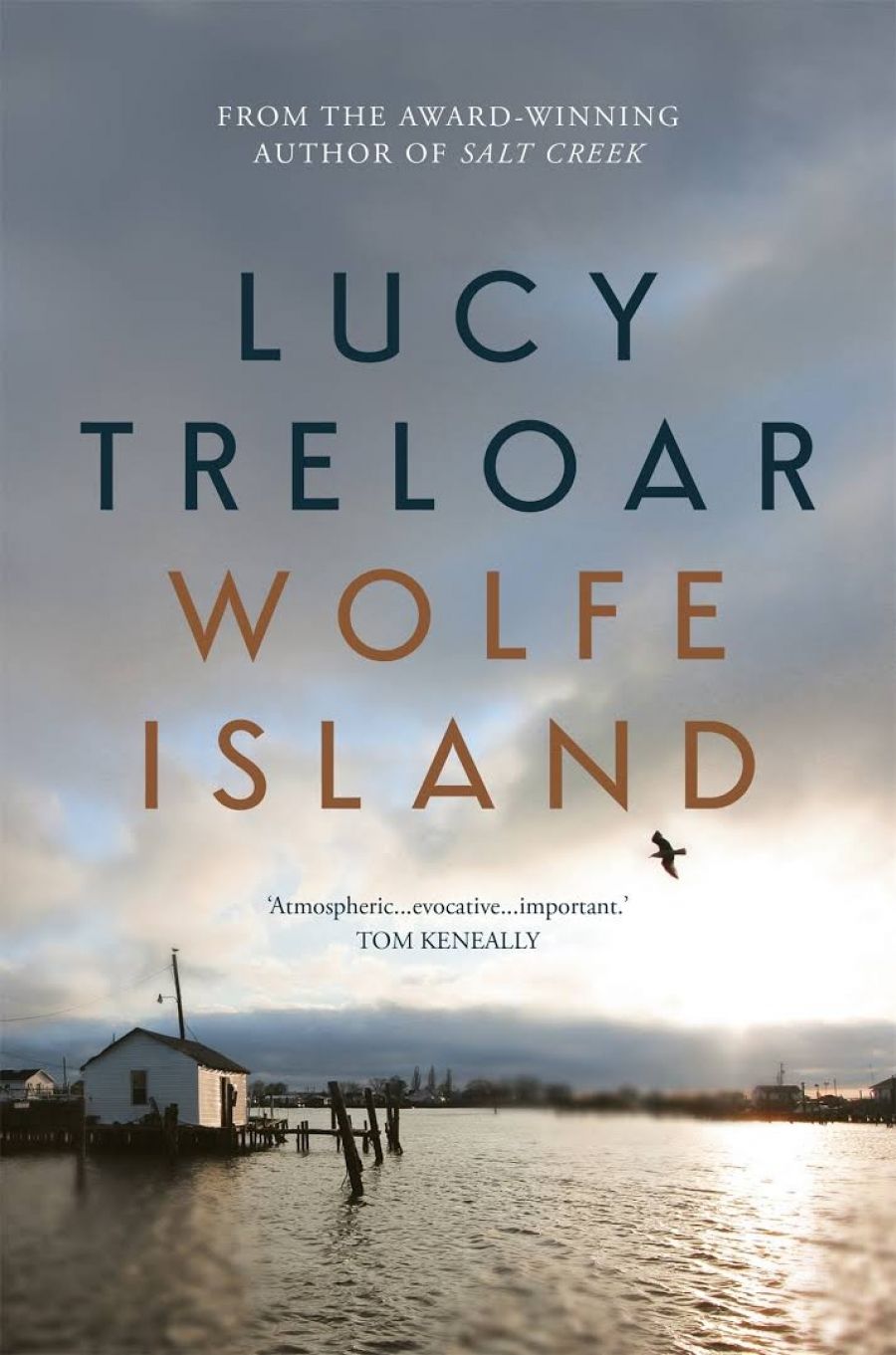
- Free Article: No
- Contents Category: Fiction
- Review Article: Yes
- Online Only: No
- Custom Highlight Text:
With Wolfe Island, Lucy Treloar joins a growing number of novelists whose fiction is marked by anthropogenic catastrophe. Her latest offering confronts two urgent global crises: the climate emergency, and the plight of refugees. Treloar reveals startling connections between the two through the shared thread of displacement in ...
- Grid Image (300px * 250px):

- Alt Tag (Grid Image): Naama Grey-Smith reviews 'Wolfe Island' by Lucy Treloar
- Book 1 Title: Wolfe Island
- Book 1 Biblio: Picador, $29.99 pb, 392 pp, 9781760553159
Treloar’s grim vision requires an alarmingly small departure from reality: refugees running for their lives into hostile lands; children forcibly separated from their Spanish-speaking parents at a southern border; people dying because they cannot afford health care; life-threatening pregnancy terminations; homes and farmlands lost to rising seas and salination. Treloar applies an ostranenie lens – turning the familiar strange – to make us see our world anew. Indeed, Kitty Hawke is an anti-heroine for our times.
Like Salt Creek, Wolfe Island is a deeply felt exploration of the role of place in people’s lives. For Kitty, ‘Nothing on Wolfe is truly strange to me. I have a memory for every part of it’. On its loss, she reflects, ‘no one can explain what it’s like to leave a place they love, that has held them and their family safe for as long as memory’. This seems a wise thread to follow in a political climate marked by division, since the wish to conserve a beloved place is a rare bridge between conservatives and conservationists.
The blurb locates the story in ‘a dying island sinking into the wind-lashed Chesapeake Bay’, off the US east coast. An image search of the region’s sinking streets – Daliesque houses crumbling into Atlantic blue – goes some way to explaining the novel’s eeriness. In her acknowledgments, Treloar states her Chesapeake Bay island is fictitious, and she thanks ‘the people of this beautiful region, especially Smith Island and Tilghman Island’. Another island that seems to share some of Wolfe’s attributes is Tangier. Colonised in the seventeenth century, Tangier Island is home to a small community with a proud heritage – watermen who speak with a distinct accent and work the water for crabs and oysters. Tangier’s devout Christian population supports Donald Trump, who in 2017 was reported to have assured its mayor ‘not to worry about sea-level rise’. In the novel, ‘a politician claiming some importance’ tells Wolfe’s mayor ‘not to worry; everything would be fine’. Kitty Hawke’s conclusion: ‘He turned out to be the biggest liar of all.’
Truth-telling and accountability rise like a tide through Wolfe Island. Early on, Kitty notes, ‘You decide for yourself the things you want to know about yourself ... you choose not to peer down into the mess of it all. That’s what I do, I’ll admit it. I turn away.’ But Kitty changes. When a man unleashes violence and blames his victims, she makes him face the facts: ‘He did not. She wasn’t yours. Look at that. Do not turn from that. Know that.’ Kitty’s trajectory from island recluse to protective lioness is marked by her choice to confront the sad or shameful realities that make others turn away.
A small qualm: two biblical citations are misquoted in significant ways, perhaps deliberately but to the work’s detriment. The first, from Revelation, reads: ‘The island is sinking. The isles fled away and the mountains were not found.’ The quote’s invented first part is unnecessary: it turns an already yielding true quote into an overplayed false one. The second citation, from Isaiah, reads: ‘The lion will not lie down with the lamb’. Inserting not is clearly deliberate – a rejection that, in the story’s context, calls attention to the failures of the Church. No issue there. But what of Isaiah’s original ‘wolf’ replaced here with the oft-misquoted ‘lion’? (Canines and felines play a symbolic role in the novel – in Kitty’s abiding love of dogs, in the island’s name of Wolfe, and in the naming of characters: Kitty, Cat, Lionel.) These revisions diminish the quotes’ impact in a book where allusions are otherwise deployed to great effect.
This is Treloar’s second novel, but she is already in full possession of her powers, as assured and ambitious as Barbara Kingsolver or Isabel Allende. Her work sounds a warning for the future should we fail to face today’s inconvenient truths. It holds the possibility of hope, if not hope itself, while staring into the darkness. Wolfe Island is not to be missed.



Comments powered by CComment